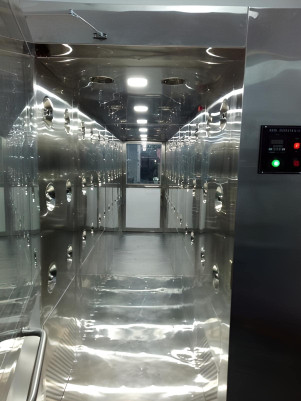

Fri Sep 10, 2021
Air Shower Tunnel
An air shower tunnel (or air shower) is a specialized enclosed entryway, often shaped like a tunnel or chamber, installed at the entrance to a cleanroom or other controlled environment.
Its primary function is to decontaminate personnel and materials by removing loose surface particles (like dust, lint, and microorganisms) before they enter the controlled area.
Here's a breakdown of its features and uses:
Decontamination: High-velocity jets of HEPA-filtered (High-Efficiency Particulate Air) or ULPA-filtered air are blown from nozzles on the walls and ceiling.
The air streams, typically at speeds between 6,000 and 8,000 feet per minute (FPM) or 30−40 meters per second, create a "scrubbing" or "flapping" action on garments to dislodge particles.
Personnel usually stand and rotate slowly, or walk through the tunnel, for a timed cycle (e.g., 30−45 seconds).
Filtration: The contaminated air is then drawn out through vents near the floor, circulated back through a pre-filter and the main HEPA/ULPA filter, and re-circulated back to the nozzles in a closed-loop system. This ensures only clean air is used for decontamination.
Airlock and Pressure Control: Air showers typically have two interlocked doors (electromagnetic locks) that prevent both doors from opening simultaneously. This creates an airlock, helping to maintain the required pressure differential between the cleanroom and the surrounding area, thus preventing contamination from spreading.
Traffic Control: The doors remain locked during the decontamination cycle, enforcing protocol adherence before entry to the cleanroom.
Construction Material: Typically made from cleanroom-compatible materials like powder-coated steel or stainless steel (304 or 316L) for corrosion and chemical resistance.
Filtration: Utilizes HEPA filters (99.97% efficient on 0.3 μm particles) or ULPA filters (up to 99.999% efficient on 0.12 μm particles).
Air Velocity: High velocity at the nozzle, often >20 meters per second (>3,900 FPM).
Air Cleanliness: Helps the transition into classified environments, often designed for ISO Class 5, 6, 7, or 8 cleanrooms.
Safety Features: Includes emergency stop buttons (which release the door locks) and often motion sensors to initiate the cycle.
Types: Available in single-person chambers, multi-person tunnels (for high traffic), L-shaped, and straight-through designs. Larger units are also available as cargo air showers for cleaning equipment like carts or pallets.
Air shower tunnels are a critical component in contamination control for industries such as:
Pharmaceuticals and Biotechnology
Micro-electronics and Semiconductor Manufacturing
Medical Device Manufacturing
Aerospace
Laboratories and Research Facilities
Food Processing (where high-level hygiene is required)